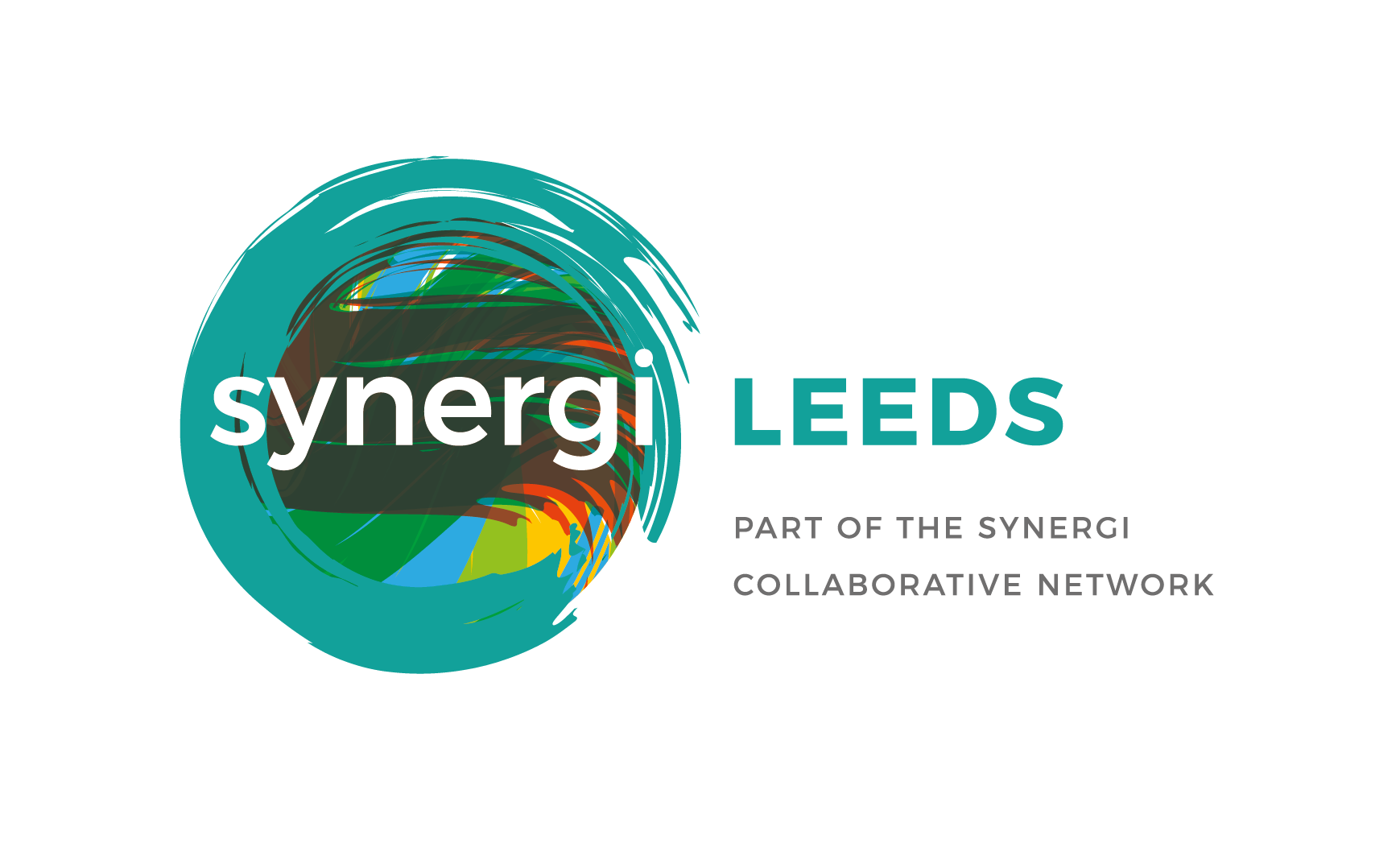For Race Equality Week 2024, Mindful Employer Project Coordinator, Leigh Staunton, caught up with Synergi Leeds Coordinator, Del Saunders, to talk about microaggressions, allyship and the importance of learning about other cultures and religions.
Del also talks about the important work of Synergi Leeds and is excited to announce that applications for the next round of Synergi Leeds grant funds are now open.

What are racial microaggressions in the workplace?
Microaggressions are experienced every day within the workplace and everyday life. They are subtle behaviours that affect members of marginalised groups and can add up and create even greater conflicts and offence over time.
The simplest way to describe microagressions are when someone has crossed the line by showing insensitivity or bias and this shows up in the form of discrimination, prejudice or harassment.
For example, asking someone where they are from and they respond saying they’re from Leeds, West Yorkshire, but the aggressor then presses further by asking no, where are you really from originally? Or, complimenting someone on how well they speak English because you are assuming they didn’t grow up here because they are from an ethnically diverse group when actually, English has always been their first language.
What kind of impact can such workplace microaggressions have on individuals experiencing them at work?
It can be psychologically damaging in terms of trying to identify if you’re being overly sensitive or if the microaggression is something that’s actually happening. There’s always a seed of self doubt. And, at times people aren’t sure how to approach it because it’s not overt racism. It can be hard to prove the angle the aggressor was coming from and therefore the individual feels disempowered. It can lead to feeling isolated and at times it can create a ‘them and us’ type of environment. This breeds disconnection.
Can allyship help reduce the impact of microaggressions in the workplace?
People can apply a 4 level approach to allyship in order to better understand people from marginalised groups. This four-level approach — Acknowledge, Converse, Educate, and Stance —provides a clear roadmap for those just starting their allyship journey, enabling them to make a meaningful impact with people who are most likely to experience microaggressions.
Acknowledge that whatever has been assumed and said may have caused offence.
Converse by being open to have the conversation about the assumption and its impact.
Educate yourself and others on how microaggressions can be damaging and reflect on how to ask questions in a culturally sensitive way.
Stance is about being proactive in changing the work culture to be inclusive of all diverse groups and being mindful about how people may receive information and adjusting your communication to take this into account.
Tell us about your “Ask don’t Assume” mantra and how can employers and employees implement this at work?
The “Ask don’t Assume” mantra encourages people to have authentic conversations about race and culture from the perspective of someone who genuinely wants to learn and understand rather than someone who assumes something and gets it wrong.
For example, assuming most ethnically diverse groups will share the same characteristics and values because they are from marginalised groups. It’s better to ask someone as individual rather than assuming that a particular thing will apply to their lives as a consensus.
Employers could implement this at work by having a development session dedicated to learning about diversity and equality in the workplace. This is a good commitment from an organisation to be inclusive across the board by encouraging employees to learn from one another rather than making assumptions.
Why would you encourage everyone to actively learn more about other cultures, races and religions? And how can employers help employees do this?
We exist in a multicultural society and in order to thrive in a united way we need to be able to understand one another beyond the surface level.
Leeds City Council are a great example of how to celebrate diversity across the organisation to encourage learning, inclusivity and communication. They do this by celebrating and showcasing all cultural holidays throughout the year via various comms channels, including the CEO’s weekly newsletter. A recent newsletter also provided extra information on Guru Nanak, the founder of Sikhism. This encourages employees to learn facts about different groups that they may have not known before. That learning breeds connection.
Tell us a bit about the Race Equality Network at Leeds City Council and the different activities they do?
This group is really active and pulls in large numbers from across the council. The network meetings focus on wellbeing topics to discuss and lead to actions that can spread beyond the group. Different guest speakers are invited to cover numerous topics that can help members professionally and personally. This group leads on Black History Month celebrations within the council, for example. They also offer wellbeing walks and virtual coffee break chats. In addition, they share relevant news and communications for people within the group, eg. job opportunities, events, training and further guidance on culture and religion.
Today is the first day of Race Equality Week; tell us about the 5 Day Challenge.
Created for Race Equality Week, the 5-Day Challenge enables you to set 5 different activities for you and your employees to engage in over 5 days.
The activities help employees reflect and, more importantly, take action to drive Race Equality.
The 5-Day Challenge provides employees with an opportunity to learn, self-reflect, and commit to action that will drive change. Each daily activity takes just 5 minutes so it’s 5, 5 minute challenges over 5 Days.
A statement from Race Equality Matters explains, “If we can involve the majority of your colleagues, if not everyone, within your organisation, we believe we will see a much-needed shift in beliefs, cultures, behaviours, and outcomes for race equality. Small changes can make a real difference in how people feel.”
There are ready-to-go, downloadable PDFs for each day that can be easily distributed to employees or accessed via your organisation’s employee portal.
On the last day, everyone who has taken part will be ready to make a Big Promise as part of a commitment to action for change.
Tell us about the Synergi Leeds Network and how employers can get involved
The Synergi-Leeds Partnership, established in 2018, seeks to redress racial injustice and ethnic inequalities in mental health in Leeds. Led by Leeds and York Partnership NHS Foundation Trust and Leeds City Council, the partnership includes membership from the third sector and statutory services and is instrumental in supporting the delivery of Priority 2 within the Leeds All-Age Mental Health Strategy, to reduce the over-representation of people from ethnically diverse communities admitted to mental health services in crisis.
The Synergi-Leeds network aims to energise and enable the community and organisations to make changes within their own services and systems. As such, the network has grown to operate as a community of practice. In addition to the network, a small core team supports the network function and capacity building across the system through project work streams and creative engagement and collaborates with Words of Colour on its co-developed creative and strategic intervention (Creative Spaces) and Remembering What’s Forgotten.
Synergi-Leeds are winners of the Legacy Awards 2022 and the HSJ Award for Mental Health Innovation of the Year 2023, for its creative and impactful collaborations.
Employers can find out more by contacting the Synergi-Leeds Coordinator, Del at delvina.saunders@leeds.gov.uk to arrange an introduction. Synergi-Leeds welcomes the input and support of employers across the city, whether they are public, private or third sector and irrespective of industry.
Tell us about the exciting new grant funding opportunities available via the Synergi Leeds Network. Who is eligible and how can they apply?
We are really excited to be able to launch our second cohort of grant funds which focuses on addressing mental health inequalities in minority ethnic groups. This particular fund will have a direct focus on the transition age group of 16 – 25 year olds and will look at funding programmes of work for up to one year in duration. The programmes of work would focus on one or more of the following – building capacity, reducing stigma and increasing trust, access to early intervention for developing mental health issues.
Applications will be welcome from the 5th of February. For more information, please click here.
A big thank you to Del for talking to us for this blog.
Want to get involved?
Join the Leeds Mindful Employer Network here.
Don’t miss out on our next free in-person event on the 19th March hosted by our Mindful Employer of the Quarter, AW Hainsworth, “Overcoming Stigma: Mental Health Awareness and Support at AW Hainsworth”. You can book your place here.
Did you know tickets are now available to book for our FREE Leeds Mindful Employer Network Conference 2024, “Creating Mentally Healthy Workplaces” at Leeds Beckett University, Carnegie School of Sports. Demonstrate your commitment to the positive mental health of your workforce by registering your free place here.



